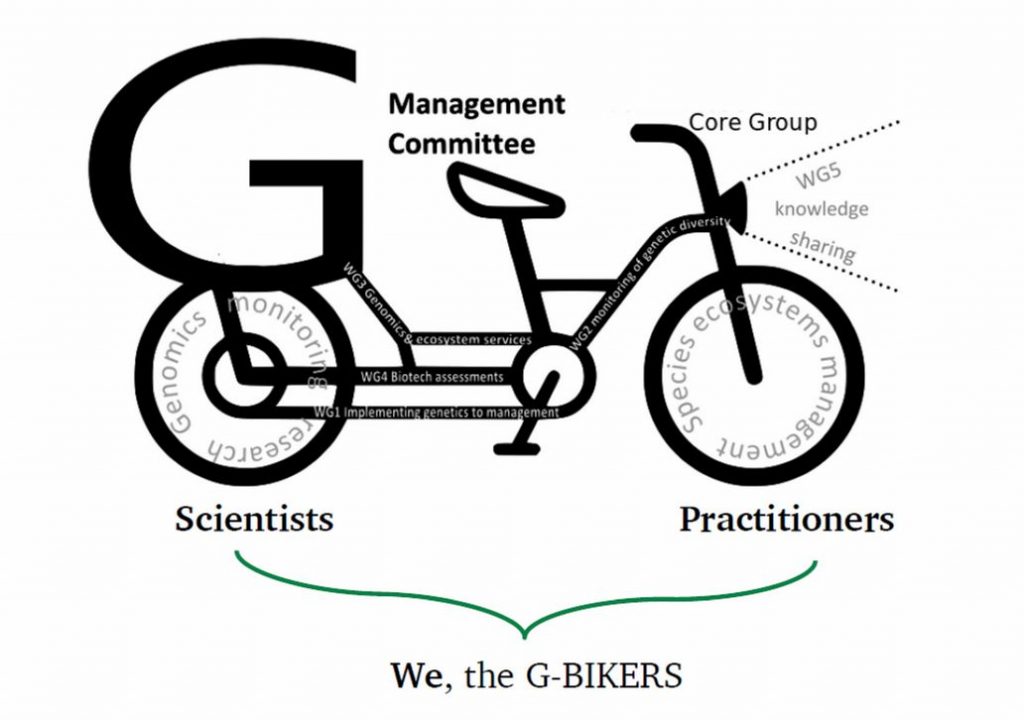A project with an interesting acronym – G-BiKE, COST Action Genomic Blodiversity Knowledge for Resilient, is a newly funded project of the European Union with the aim to connect scientists, managers and users of natural wealth across Europe in order to emphasize the importance of applying scientific knowledge of genetics and genomics in the conservation of plant and animal life.
Although today genetic information can be obtained for most of the organisms, standardisation of the protocols for detecting and monitoring species’ genetic diversity and their adaptive potential is still missing. The main idea of the G-BiKE project is to establish the usage of genomic knowledge as a standard tool in the environmental protection programmes, in order to ensure the persistence of populations and species.
 As the acronym of the project alludes to a bicycle, the main idea of the project is to connect two wheels, one symbolising scientists and the other all the practitioners directly involved in the application of ecosystem protection programmes. The project started with a meeting in Brussels attended by 45 scientists from 27 European countries. Serbia was represented by three scientists: Prof Dr Mihajla Djan, full professor at the Faculty of Sciences in Novi Sad, Dr Nevena Velickovic, assistant professor at the Faculty of Sciences in Novi Sad and Dr Srdjan Stojnic, research associate at the Institute of Lowland Forestry and the Environment in Novi Sad.
As the acronym of the project alludes to a bicycle, the main idea of the project is to connect two wheels, one symbolising scientists and the other all the practitioners directly involved in the application of ecosystem protection programmes. The project started with a meeting in Brussels attended by 45 scientists from 27 European countries. Serbia was represented by three scientists: Prof Dr Mihajla Djan, full professor at the Faculty of Sciences in Novi Sad, Dr Nevena Velickovic, assistant professor at the Faculty of Sciences in Novi Sad and Dr Srdjan Stojnic, research associate at the Institute of Lowland Forestry and the Environment in Novi Sad.
Scientific programme of the Action is divided in five thematic units which are organized as working groups. The team from Serbia will participate in the working group focusing on the implementation of genetic markers as indicators for monitoring the state of natural populations. The work of this group will result in a unique database including the species of the European continent which are crucial for the development of genetic and genomic markers and the list of areas of special importance for the implementation of environmental protection measures (the areas which are prone to fast changes or which represent cross-border areas of species distribution).
Dr Cristiano Vernesi from Italy was appointed as the Action Chair, and during the first meeting other leaders were appointed, including a representative from Serbia – dr Nevena Velickovic who was appointed as the Science Communication Manager.
Note:
The project was obtained within the COST programme. COST is an intergovernmental framework for European cooperation in the domain of science and technology which opens space for the projects, which have already been financed at the national level and involve at least five institutions from the programme member countries, to be coordinated at the European level. COST programme financially supports the collaboration activities such as organising conferences, seminars, working group meetings, meetings of the executive boards of individual projects within the programme, participation in summer schools, as well as travel expenses for short-term scientific visits.
